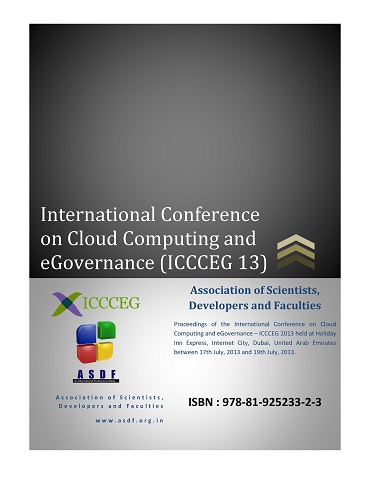- Publication Meta:Value
- Short Title:ICCCEG 2013
- Publisher:ASDF, India
- ISBN 13:978-81-925233-2-3
- ISBN 10:81-925233-2-2
- Language:English
- Type:Hard Bound - Printed Book
- Copyrights:ICCCEG Organizers/ [email protected]
- Editor-in-Chief:Manikandan Ayappan
- Conference Dates:17 - 19, July 2013
- Venue Country:Holiday Inn Express, Internet City, Dubai, United Arab Emirates
- Submitted Papers:58
- Acceptance Rate:15.51%
- Website:www.iccceg.org
Welcome to ASDF Electronic Digital Library!
ICCCEG 2013
ICCCEG 2013
International Conference on Cloud Computing and eGovernance 2013
Paper 009
E-Government Adoption in Developing Countries : The Case of South Africa
Willard Munyoka1,Mungofa Francis Manzira2
1,2University of Venda,
Abstract
The rapid proliferation and pervasiveness of information communication technology (ICT) across the world with its huge potential to transform government entities to become efficient, has witnessed huge e-Government (E-Gov) projects being undertaken by the South African government to strategically gear itself for the twenty first century. These ICT initiatives based on the interest and the World Wide Web (WWW) are intended to capacitate the government through digitization to respond well to its immense challenges namely: efficient public service delivery, efficient working, effective communication with its citizens and the business community, improve managerial effectiveness of public offices and promote democratic values and mechanisms. This paper focus on expploring the implementation of e-Gov initiatives taking place in three speific frontiers in South Africa: e-Citizen (G2C - Government-to-Citizen) and e-Society (G2B - Government-to-Business) and give an analysis of the success and constrains of such endeavours. In this paper we extensively explore contemporary research undertaken in this field and explore the actual e-Government websites for in-depth comprehenship of the developments. The study found that South Africa has made tremendous positive achievements in its e-Government endeavours to digitize the delivery of its services and all levels. However, great concerted effort from all involved parties is required to overcome the considerable challenges being faced. In conclusion, e-Gov process enquires a coherent strategy, commencing with an explaintaion of the nation's political will, resources, regulatory environment, and the ability of the populaion to make use planned technologies.
The study provides vital information and recommendations for policy makers for shaping the future of e-Gov in all government entitles.
Keywords
Author's Profile
Author profile can be generated and linked through our partners World Book of Researchers. To include your profile online Click Here. After it is approved, please email to edlib @ asdf.res.in to create a link with all the papers.
e-AID
ICCCEG.2013.009
Cite this Article as Follows
Willard Munyoka, Mungofa Francis Manzira. E-Government Adoption in Developing Countries : The Case of South Africa. International Conference on Cloud Computing and eGovernance 2013. Vol. 1. Chennai: Association of Scientists, Developers and Faculties, 2013. 53-58. Print.
© 2010 - by EDLIB .
All Rights Reserved.

